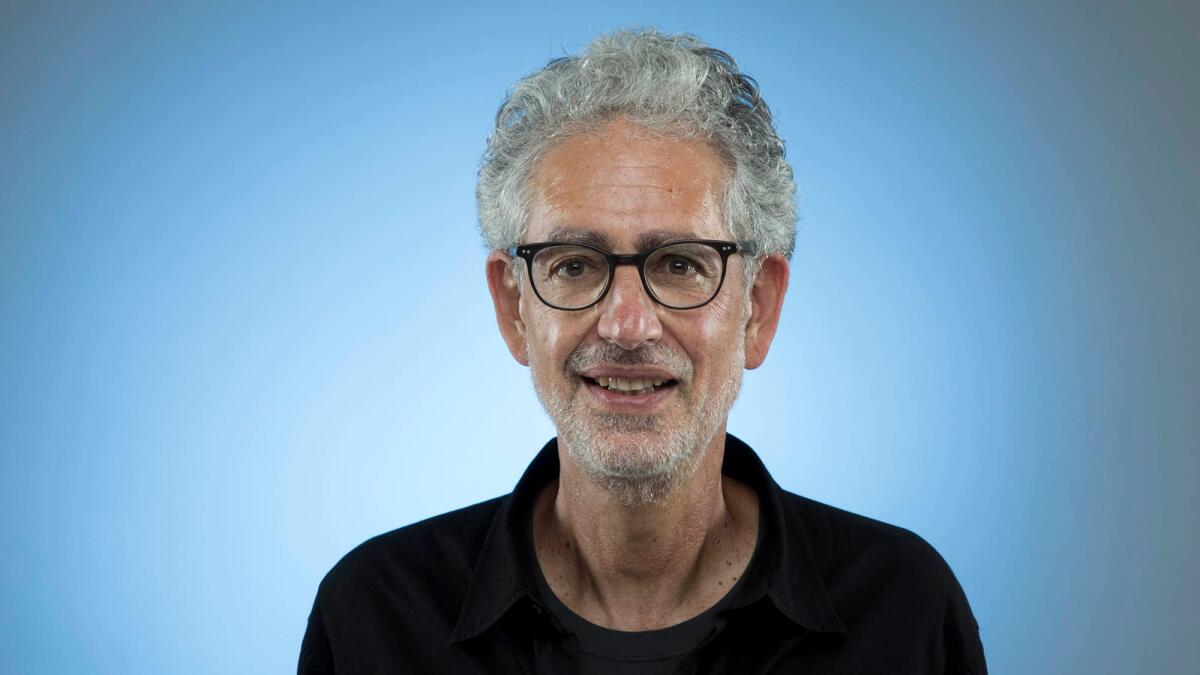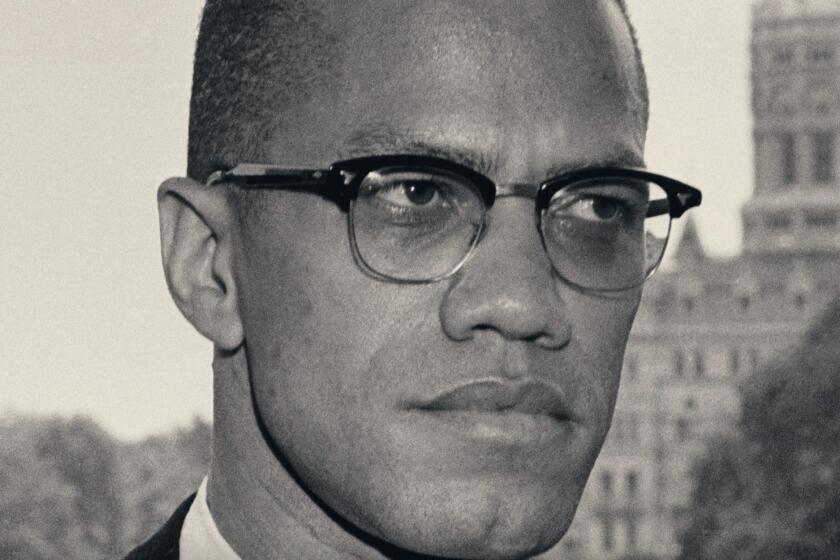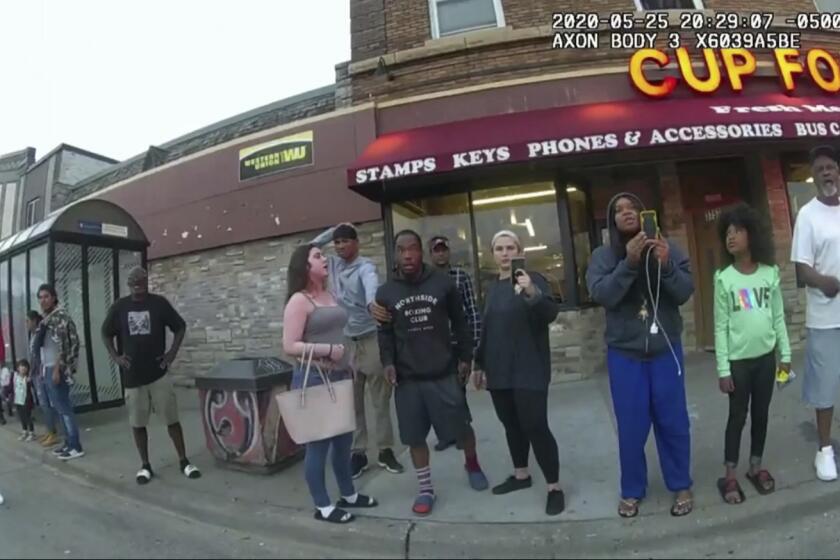L.A. Times’ Robert Greene awarded Pulitzer Prize for editorial writing

- Share via
Robert Greene of the Los Angeles Times was awarded the Pulitzer Prize on Friday for a series of editorials that advanced the cause of criminal justice reform, in a year when that subject moved to the front of the media and political agenda in much of America.
The Pulitzers for work published in 2020 acknowledged the extraordinary tumult that followed the killing of George Floyd in May and the extreme fracturing of society that came with the COVID-19 pandemic.
In the 14 journalism categories, the judges selected 11 winners for delving into issues of justice and race or into the greatest health emergency to strike the world in more than a century.
The predominance of those topics extended to the most prestigious of the journalism awards, for public service, which went to the New York Times for “prescient and sweeping coverage of the coronavirus pandemic that exposed racial and economic inequities [and] government failures in the U.S. and beyond.”
In addition to Greene, the Los Angeles Times’ Brittny Mejia and Jack Dolan were named Pulitzer finalists in the local reporting category for an investigation into shortcomings in the Los Angeles County medical system, and Mark Swed was a finalist for his classical music criticism.
Greene and The Times took the award in the editorial writing category for pieces that his editors said brought “insight, precision and clarity” to thorny issues such as bail reform, juvenile justice sentencing and the plight of prisoners during the COVID-19 pandemic. The Pulitzer judges said the work “clearly and holistically examined the Los Angeles criminal justice system.”
The 62-year-old writer culminated 2020 with a stark assessment of the nation’s substantial shortcomings during a year of plague and brutality. He concluded with a clarion call for America to do better.
“A clearer vision of ourselves and the chasm between who we are and what we aspire to be is necessary to any improvement,” the Dec. 30 editorial said. “If we can name our shortcomings, surely we can fix them.”
Among winners of the 2021 Pulitzer Prizes are novelist Louise Erdrich, Malcolm X biographer Tamara Payne and the post-Reconstruction history “Wilmington’s Lie.”
Like all of the seven pieces submitted for the prize, the essay ran under the byline of “The Times Editorial Board.” Greene’s award was the 48th Pulitzer Prize for The Times since 1942, including six gold medals for public service.
Dolan and Mejia were recognized in local reporting for a series of stories showing how patients waiting to see specialists at Los Angeles County’s public hospitals suffered long and sometimes deadly delays. Even doctors whose care could mean the difference between life and death sometimes left patients waiting for months.
A nearly two-year investigation revealed how patients in a sprawling public health system, which serves the poorest and most vulnerable residents, often suffered debilitating setbacks as they waited to see neurologists, kidney experts, cardiologists and other doctors. Many did not survive the delays.
Swed was cited in the criticism category for his series “How to Listen,” which enlightened readers about how he, and they, could find strength and solace in musical recordings during the pandemic.

With concert halls silenced, editors said that The Times’ classical music critic had explored “music as message, as feeling, as faith and — as a virus isolated individuals at home for months on end — music as connection.” Swed also was a finalist for the criticism prize in 2007.
Dr. Patrick Soon-Shiong, owner and executive chairman of The Times, speaking to the staff via video conference, said the Pulitzers recognized the kind of journalism he wanted to preserve when he purchased the newspaper three years ago.
“This is why we bought The Times, not only to save great journalism, but to really stand up for those who have no voice,” Soon-Shiong said, as he sat beside his wife and the paper’s co-owner, Michele. “We fight for the underdog, we fight for justice and to just do the right thing.”
Kevin Merida, who became executive editor of The Times only last week, urged his new colleagues to celebrate and to keep at their work. “Let’s keep changing lives,” he said, “and making an impact.”
Sewell Chan, editor of the editorial pages, said Greene had been a “hidden treasure” within The Times for many years, because he, like other editorial writers, wrote his stories without bylines. He said the staff was fortunate that Greene had thrown off his earlier work as a municipal bond lawyer after he decided that “journalism was more interesting.”
Chan credited Greene as “a big reason Los Angeles is at the forefront of debates over how the justice system can become more fair, humane and equitable.”
Greene thanked his editors and fellow editorial board members, noting that his work grew out of their lengthy debates about the most pressing issues of the day.
“We get together and we argue,” he said. “We argue a lot. We argue for a living, which is a very cool job. And our editorials are shaped by those arguments.”
Greene has written about topics as diverse as water, drought and mental health, focusing keenly on the criminal justice system over the last decade. He has been with The Times for 15 years, scarcely slowing after a 2010 lymphoma diagnosis from which he fully recovered.
He noted that during his cancer treatment, editorial board colleagues helped cover for him at work, while journalists from The Times’ newsroom, whom he did not even know, contributed blood for his treatments.
He said the collaborations had created not only “groundbreaking, essential journalism,” but “in a very real sense, saved my life. I literally have the blood of many of you running through my veins.”
Darnella Frazier, who pulled out her phone and recorded the police restraint and death of George Floyd, has been awarded a special Pulitzer citation.
The extraordinary attention to race and justice began with the killing of Floyd by Officer Derek Chauvin. The staff of the Star Tribune of Minneapolis received the breaking news Pulitzer for its coverage of the murder “and the reverberations that followed.” Associated Press photographers were honored for their photos capturing the subsequent unrest that swept U.S. cities.
Mitchell S. Jackson took the feature writing prize for his account in Runner’s World magazine of the killing of Ahmaud Arbery, a Black man who was out for a run when he was gunned down. Michael Paul Williams of the Richmond (Va.) Times-Dispatch won the commentary award for columns about that Southern city’s dismantling of Confederate war memorials.
The Pulitzer board reached outside its usual award categories to give a special citation to Darnella Frazier, the 17-year-old who stood on a sidewalk and used her phone to record video as Chauvin knelt on Floyd’s neck for almost 10 minutes. The unusual recognition acknowledged the important role that citizens can play in the search for truth.
Other prizes went to work focused sharply on the scourge unleashed early last year by the coronavirus.
Among those was the Atlantic’s Ed Yong, honored for explanatory reporting for stories “that anticipated the course of the disease, synthesized complex challenges, illuminated the U.S. government’s failures and provided clear context for the challenges it posed.”
David Zucchino, a former Los Angeles Times reporter, won the Pulitzer for general nonfiction for his book, “Wilmington’s Lie: The Murderous Coup of 1898 and the Rise of White Supremacy.” It offered a probing review of the dismantling of the multiracial government in that North Carolina city. Zucchino previously won a Pulitzer for his reporting from South Africa.
Greene, a graduate of USC and Georgetown Law, previously worked for the L.A. Weekly as a reporter and as an associate editor for the Metropolitan News-Enterprise.

In mid-March of last year, he was among the first journalists to warn of the potential health calamity in prisons and jails, where inmates could not observe safety precautions during the coronavirus crisis.

He called for the early release of many elderly, nonviolent and short-time prisoners, saying it would help protect not only them, but those they inevitably could infect once they left their lockups.
To Greene, the pandemic presented an opportunity to assess the broader failings of mass incarceration. “When the crisis abates and we have caught our collective breath, we can ask ourselves why we lock up so many suspects, defendants and convicts in the first place,” said the editorial, “and whether they all need to be behind bars for us to be safe.”
A June editorial bemoaned America’s failure to learn from an earlier crisis — the crack cocaine epidemic of the 1980s. The decision by voters and lawmakers to treat drug users as criminals, rather than addicts, “led directly to the nation we now inhabit, overwhelmed by serious illness, fear, anger, mutual mistrust and a level of inequity and incompetence that mocks our self-image as Americans.”
Going forward, Greene urged the country to “build a system of care that fosters health and justice, and deconstruct the costly police-and-prisons infrastructure that we foolishly built instead.”
Greene’s co-workers praised his cool rationality and rejection of hidebound ideology.
He authored The Times’ endorsement of George Gascón, the left-leaning candidate who would be elected Los Angeles County district attorney. He also wrote an editorial that made an impassioned plea for an end to violence, after the ambush shooting of two sheriff’s deputies at a Metro station in Compton.
“The nation, in desperate need of cooler heads and an end to a season of death, must for the present make its way with neither,” he wrote. “We have in our hands the power to destroy ourselves and one another, and we seem bent on exercising it.”
Seeing a need for judicious progress on all sides, Greene concluded: “The hunt for the deputies’ shooter must continue. If a suspect is caught and tried, the proceedings should be conducted with truth and fairness. Law enforcement practices must be scrutinized and, where needed, corrected. Racism must be acknowledged and combated. Our communities, our people, must get a chance to breathe.”
More to Read
Sign up for Essential California
The most important California stories and recommendations in your inbox every morning.
You may occasionally receive promotional content from the Los Angeles Times.













